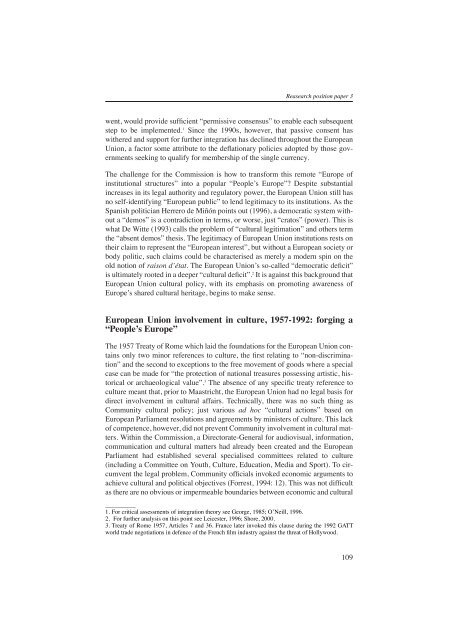<strong>Differing</strong> <strong>diversities</strong>culture they have employed. 1 This paper examines the development <strong>of</strong> <strong>Europe</strong>anUnion cultural policies from a historical and anthropological perspective byaddressing two questions. First, why has “culture” – a subject that prior to the1980s was deemed <strong>of</strong> esoteric and marginal interest – emerged as such an importantconcern for <strong>Europe</strong>an Union policy makers? Second, what are the implications<strong>of</strong> the <strong>Europe</strong>an Union’s increasing intervention in the cultural domain fordebates about cultural diversity, citizenship, social exclusion and democracy?The main proposition advanced below is that <strong>Europe</strong>an Union cultural policy isdriven by problematic assumptions about “culture” as an integrative mechanism.<strong>Europe</strong>an Union policy makers have sought to harness culture as a vehicle for promotingsolidarity and social cohesion among <strong>Europe</strong>ans, but the eurocentrism andclass bias inherent in their conceptions <strong>of</strong> culture also promote exclusion andintolerance, particularly towards those who fall outside the boundaries <strong>of</strong> <strong>of</strong>ficial<strong>Europe</strong>an culture, including Africans, Asians and other categories <strong>of</strong> “non-<strong>Europe</strong>an”. The <strong>Europe</strong>an Union’s record on combating racism suggests that itclearly recognises the multicultural character <strong>of</strong> contemporary <strong>Europe</strong>an societies.However, this is not reflected in its cultural policy, which typically expresses theinterests and assumptions <strong>of</strong> <strong>Europe</strong>an political elites, and a small but growingBrussels-based cultural lobby. While specific cultural initiatives invariably resultfrom compromises and bargains between individual member states, <strong>Europe</strong>anUnion cultural policy in its general sense has been shaped primarily by politicalfactors. 2 <strong>Europe</strong>an Union policy makers have long held the belief that to forge aunited <strong>Europe</strong> requires not simply economic and monetary union or a shared legaland political architecture, but also the creation <strong>of</strong> a more palpable sense <strong>of</strong><strong>Europe</strong>an consciousness and shared identity among the peoples <strong>of</strong> <strong>Europe</strong>.The theoretical background to this can be briefly stated. All political systems, particularlydemocratic ones, seek legitimacy in the cultural field. 3 In order to havelegitimacy and authority, political institutions must enjoy the consent <strong>of</strong> the citizensin whose name they govern. The cultural foundations <strong>of</strong> modern citizenship,as Kalberg (1993) has noted, are civic responsibility and social trust, both <strong>of</strong> whichdepend upon the sense people have <strong>of</strong> belonging to a political community. To date,however, lack <strong>of</strong> popular support for the <strong>Europe</strong>an Union remains a key obstacleto its project for <strong>Europe</strong>an integration. The problem is that the peoples <strong>of</strong> <strong>Europe</strong>have failed to embrace <strong>Europe</strong>an institutions and ideals in the way that was hopedfor or, indeed, predicted by traditional theories <strong>of</strong> integration. According to influentialtheorists <strong>of</strong> integration, including Ernst Haas and Leon Lindberg, popularloyalty to the <strong>Europe</strong>an Community would grow as each successive step towardsever-closer union demonstrated the material benefits to be gained by further integration(Haas, 1958; Lindberg, 1963). This instrumental loyalty, so the argument__________1. For a more considered debate about the potential scope <strong>of</strong> the culture concept, see <strong>Europe</strong>anCommission, 1996.2. While I would stress the political rationale behind the <strong>Europe</strong>an Union’s growing interest in culture,it also reflects the <strong>Europe</strong>an Union’s increasing recognition <strong>of</strong> the commercial importance <strong>of</strong> the culturalindustries, particularly in the fields <strong>of</strong> tourism and communications technologies.3. For a good analysis <strong>of</strong> this argument see Habermas, 1992.108
Reasearch position paper 3went, would provide sufficient “permissive consensus” to enable each subsequentstep to be implemented. 1 Since the 1990s, however, that passive consent haswithered and support for further integration has declined throughout the <strong>Europe</strong>anUnion, a factor some attribute to the deflationary policies adopted by those governmentsseeking to qualify for membership <strong>of</strong> the single currency.The challenge for the Commission is how to transform this remote “<strong>Europe</strong> <strong>of</strong>institutional structures” into a popular “People’s <strong>Europe</strong>”? Despite substantialincreases in its legal authority and regulatory power, the <strong>Europe</strong>an Union still hasno self-identifying “<strong>Europe</strong>an public” to lend legitimacy to its institutions. As theSpanish politician Herrero de Miñón points out (1996), a democratic system withouta “demos” is a contradiction in terms, or worse, just “cratos” (power). This iswhat De Witte (1993) calls the problem <strong>of</strong> “cultural legitimation” and others termthe “absent demos” thesis. The legitimacy <strong>of</strong> <strong>Europe</strong>an Union institutions rests ontheir claim to represent the “<strong>Europe</strong>an interest”, but without a <strong>Europe</strong>an society orbody politic, such claims could be characterised as merely a modern spin on theold notion <strong>of</strong> raison d’état. The <strong>Europe</strong>an Union’s so-called “democratic deficit”is ultimately rooted in a deeper “cultural deficit”. 2 It is against this background that<strong>Europe</strong>an Union cultural policy, with its emphasis on promoting awareness <strong>of</strong><strong>Europe</strong>’s shared cultural heritage, begins to make sense.<strong>Europe</strong>an Union involvement in culture, 1957-1992: forging a“People’s <strong>Europe</strong>”The 1957 Treaty <strong>of</strong> Rome which laid the foundations for the <strong>Europe</strong>an Union containsonly two minor references to culture, the first relating to “non-discrimination”and the second to exceptions to the free movement <strong>of</strong> goods where a specialcase can be made for “the protection <strong>of</strong> national treasures possessing artistic, historicalor archaeological value”. 3 The absence <strong>of</strong> any specific treaty reference toculture meant that, prior to Maastricht, the <strong>Europe</strong>an Union had no legal basis fordirect involvement in cultural affairs. Technically, there was no such thing asCommunity cultural policy; just various ad hoc “cultural actions” based on<strong>Europe</strong>an Parliament resolutions and agreements by ministers <strong>of</strong> culture. This lack<strong>of</strong> competence, however, did not prevent Community involvement in cultural matters.Within the Commission, a Directorate-General for audiovisual, information,communication and cultural matters had already been created and the <strong>Europe</strong>anParliament had established several specialised committees related to culture(including a Committee on Youth, Culture, Education, Media and Sport). To circumventthe legal problem, Community <strong>of</strong>ficials invoked economic arguments toachieve cultural and political objectives (Forrest, 1994: 12). This was not difficultas there are no obvious or impermeable boundaries between economic and cultural__________1. For critical assessments <strong>of</strong> integration theory see George, 1985; O’Neill, 1996.2. For further analysis on this point see Leicester, 1996; Shore, 2000.3. Treaty <strong>of</strong> Rome 1957, Articles 7 and 36. France later invoked this clause during the 1992 GATTworld trade negotiations in defence <strong>of</strong> the French film industry against the threat <strong>of</strong> Hollywood.109
- Page 5 and 6:
PrefaceThe present text constitutes
- Page 7:
Part IDiffering diversities:transve
- Page 11 and 12:
The study: background, contextand m
- Page 13 and 14:
Transversal study on the theme of c
- Page 15:
Transversal study on the theme of c
- Page 18:
Differing diversitiesi. new forms o
- Page 23 and 24:
IntroductionTransversal perspective
- Page 25 and 26:
Transversal study on the theme of c
- Page 27 and 28:
The challenge of diversityCulture,
- Page 29 and 30:
Transversal study on the theme of c
- Page 31 and 32:
Transversal study on the theme of c
- Page 33 and 34:
Diversity, citizenship, and cultura
- Page 35 and 36:
Transversal study on the theme of c
- Page 37:
Transversal study on the theme of c
- Page 40 and 41:
Differing diversitieslanguages. The
- Page 42 and 43:
Differing diversitiesprogrammes int
- Page 45 and 46:
Culture, government and diversity:p
- Page 47 and 48:
Transversal study on the theme of c
- Page 49 and 50:
Transversal study on the theme of c
- Page 51 and 52:
Transversal study on the theme of c
- Page 53:
Transversal study on the theme of c
- Page 56 and 57:
Differing diversitiesin the pursuit
- Page 58 and 59: Differing diversitiesthe need for m
- Page 60 and 61: Differing diversitiescircumstances
- Page 62 and 63: Differing diversitiesclasses artist
- Page 64 and 65: Differing diversitiesMy point, then
- Page 66 and 67: Differing diversitiesiii. that the
- Page 69: Transversal study on the theme of c
- Page 73 and 74: The consequences of European media
- Page 75 and 76: Reasearch position paper 1and contr
- Page 77 and 78: Reasearch position paper 1directly
- Page 79 and 80: Reasearch position paper 1There hav
- Page 81 and 82: Reasearch position paper 1presence
- Page 83 and 84: Reasearch position paper 1Strategic
- Page 85 and 86: Reasearch position paper 1New media
- Page 87 and 88: Reasearch position paper 1Blumler,
- Page 89 and 90: Reasearch position paper 1Hoffmann-
- Page 91 and 92: Reasearch position paper 1Pauwels,
- Page 93 and 94: Assessing the implementationof cult
- Page 95 and 96: Reasearch position paper 2tics abou
- Page 97 and 98: Reasearch position paper 2Act (GPRA
- Page 99 and 100: Reasearch position paper 2factually
- Page 101 and 102: Reasearch position paper 2The evalu
- Page 103 and 104: Reasearch position paper 2capacity
- Page 105 and 106: Reasearch position paper 2Luchtenbe
- Page 107: The cultural policies of the Europe
- Page 111 and 112: Reasearch position paper 3The histo
- Page 113 and 114: Reasearch position paper 3integrati
- Page 115 and 116: Reasearch position paper 3of differ
- Page 117 and 118: Reasearch position paper 3European
- Page 119 and 120: Reasearch position paper 3voice to
- Page 121: Reasearch position paper 3Howe, Mar
- Page 124 and 125: Differing diversitiesContemporary d
- Page 126 and 127: Differing diversitiesWhereas in the
- Page 128 and 129: Differing diversitiesbuilding on th
- Page 130 and 131: Differing diversitieswhen tackling
- Page 132 and 133: Differing diversitiesand that is pr
- Page 134 and 135: Differing diversitiesSennett, Richa
- Page 136 and 137: Differing diversitiesallowing their
- Page 138 and 139: Differing diversitiesNevertheless,
- Page 140 and 141: Differing diversitiesgrowth also ex
- Page 142 and 143: Differing diversitiesAt a deeper le
- Page 144 and 145: Differing diversitiesconventional c
- Page 146 and 147: Differing diversitiesworks, and the
- Page 148 and 149: Differing diversitiesNational sover
- Page 150 and 151: Differing diversitiesSimilarly, at
- Page 152 and 153: Differing diversitiesCoombe, Rosema
- Page 154 and 155: Differing diversitiesWoodmansee, Ma
- Page 156 and 157: Differing diversitiesIndeed, which
- Page 158 and 159:
Differing diversitiesThe second maj
- Page 160 and 161:
Differing diversitiesexample by Hol
- Page 162 and 163:
Differing diversitiesincreased broa
- Page 164 and 165:
Differing diversities“Black Carib
- Page 166 and 167:
Differing diversitiesBunt, Gary, 19
- Page 169 and 170:
Preserving cultural diversity throu
- Page 171 and 172:
Reasearch position paper 7unique, t
- Page 173 and 174:
Reasearch position paper 7legislati
- Page 175 and 176:
Reasearch position paper 7appropria
- Page 177 and 178:
Reasearch position paper 7Indeed, m
- Page 179 and 180:
Reasearch position paper 7- means t
- Page 181 and 182:
Reasearch position paper 7cyberspac
- Page 183 and 184:
Reasearch position paper 7extended
- Page 185 and 186:
Reasearch position paper 7It is rec
- Page 187 and 188:
Reasearch position paper 7lose loca
- Page 189 and 190:
Reasearch position paper 7six proje
- Page 191 and 192:
Reasearch position paper 7and innov
- Page 193 and 194:
Reasearch position paper 7Programme
- Page 195 and 196:
Reasearch position paper 7Reference
- Page 197 and 198:
Reasearch position paper 7Papers on
- Page 199:
Reasearch position paper 7Swaminath
- Page 202:
Sales agents for publications of th














